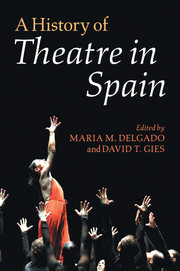Book contents
- Frontmatter
- Contents
- Illustrations
- Contributors
- Acknowledgements
- Introduction
- 1 The challenges of historiography
- 2 Lope de Vega, Calderón de la Barca and Tirso de Molina
- 3 The world as a stage
- 4 Playing the palace
- 5 The art of the actor, 1565–1833
- 6 Theatrical infrastructures, dramatic production and performance, 1700–1759
- 7 Popular theatre and the Spanish stage, 1737–1798
- 8 Theatre of the elites, neoclassicism and the Enlightenment, 1750–1808
- 9 Actors and agency in the modern era, 1801–2010
- 10 Zarzuela
- 11 Nineteenth-century Spanish theatre
- 12 Copyright, buildings, spaces and the nineteenth-century stage
- 13 Modernism and the avant-garde in fin-de-siècle Barcelona and Madrid
- 14 Continuity and innovation in Spanish theatre, 1900–1936
- 15 Theatrical activities during the Spanish Civil War, 1936–1939
- 16 Theatre, colonialism, exile and the Americas
- 17 Theatre under Franco (1939–1975)
- 18 Flamenco
- 19 Nationalism, identity and the theatre across the Spanish state in the democratic era, 1975–2010
- 20 Directors and the Spanish stage, 1823–2010
- 21 This evolution is still ongoing
- 22 Theatre as a process of discovery
- 23 Theatre is the art of the future
- Select bibliography
- Index
- References
Introduction
Published online by Cambridge University Press: 05 June 2012
- Frontmatter
- Contents
- Illustrations
- Contributors
- Acknowledgements
- Introduction
- 1 The challenges of historiography
- 2 Lope de Vega, Calderón de la Barca and Tirso de Molina
- 3 The world as a stage
- 4 Playing the palace
- 5 The art of the actor, 1565–1833
- 6 Theatrical infrastructures, dramatic production and performance, 1700–1759
- 7 Popular theatre and the Spanish stage, 1737–1798
- 8 Theatre of the elites, neoclassicism and the Enlightenment, 1750–1808
- 9 Actors and agency in the modern era, 1801–2010
- 10 Zarzuela
- 11 Nineteenth-century Spanish theatre
- 12 Copyright, buildings, spaces and the nineteenth-century stage
- 13 Modernism and the avant-garde in fin-de-siècle Barcelona and Madrid
- 14 Continuity and innovation in Spanish theatre, 1900–1936
- 15 Theatrical activities during the Spanish Civil War, 1936–1939
- 16 Theatre, colonialism, exile and the Americas
- 17 Theatre under Franco (1939–1975)
- 18 Flamenco
- 19 Nationalism, identity and the theatre across the Spanish state in the democratic era, 1975–2010
- 20 Directors and the Spanish stage, 1823–2010
- 21 This evolution is still ongoing
- 22 Theatre as a process of discovery
- 23 Theatre is the art of the future
- Select bibliography
- Index
- References
Summary
What is Spain? In any ‘history of’, this becomes the key question, the one that informs the entire work and inevitably shapes the readers' response to it. As the political and cultural boundaries of the Iberian Peninsula slowly formed themselves from the eighth century onward – boundaries which became relatively stable by the early sixteenth century as the nation-building agenda of the Catholic monarchs bore fruit – the global imaginary began to equate ‘Spain’ with Castile, the central plateau of the Peninsula that laid claim to being the seat of government (Philip II made Madrid the administrative capital in 1561) and, consequently, the very heart and soul of the country. This is just as Philip's grandparents, Ferdinand and Isabella, would have had it, and the idea that Castile was somehow more ‘Spanish’ than the rest of the country was propagated and defended by generations of writers, politicians and opinion-makers in ecclesiastical and aristocratic circles. The so-called Generation of 1898 based its entire programme on this idea, and Francisco Franco made it one of the pillars of his long dictatorship (1939–75). Yet there was never complete agreement as to what constituted that elusive entity called ‘Spain’ (and the silencing of dissenters – as with the Catalans in 1715 or the Basques and Catalans during the Franco regime – has remained problematic). The question has become even more vexed following the ratification of the Constitution of 1978, which granted undefined rights to local autonomous regions. As non-Castilian areas reclaim their linguistic and literary heritages, working both with and against a centralised ‘Spain’, it becomes more and more difficult to speak in broad geographical and political terms of a homogeneous nation-state.
The very word ‘nation’ provokes another series of questions. What constitutes a ‘nation’? Whose nation? If we have learned anything from Benedict Anderson's book, Imagined Communities, it is that nations are constructs, formed for disparate and complex reasons. If the idea of ‘nation’ is a contested one, then the idea of ‘national literature’ becomes even more so. Does something called ‘national literature’ exist? When does a nation come into being? How would a ‘nation’ produce a ‘literature’?
- Type
- Chapter
- Information
- A History of Theatre in Spain , pp. 1 - 17Publisher: Cambridge University PressPrint publication year: 2012
References
- 2
- Cited by



